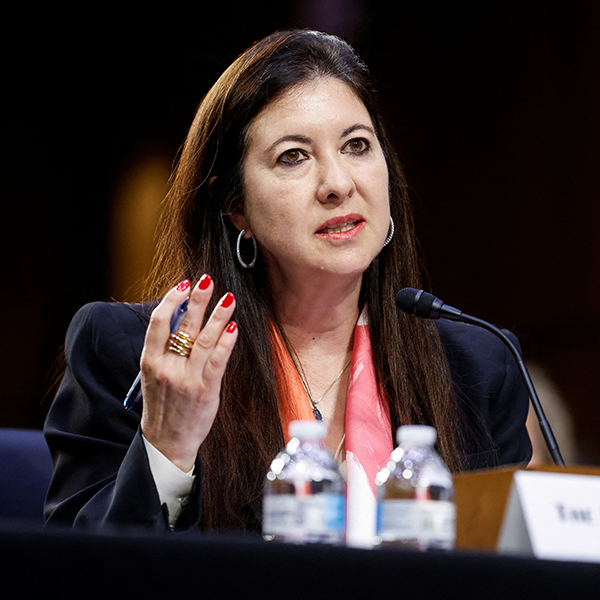Eric Girard, BCom’89, is now the Quebec government’s chief numbers guy.
The finance minister in the new Coalition Avenir Québec government of François Legault, Girard had run for office previously as a Conservative Party candidate in the 2015 federal election. A meeting with Legault convinced Girard to run again, this time at the provincial level for the CAQ.
“I didn’t know the CAQ very well and I met Mr. Legault and I liked Mr. Legault a lot because we talked about education and we talked about the economy,” says Girard.
It meant leaving his position as senior vice president, corporate treasury, at the National Bank of Canada.
“The economy and education,” are now his priorities as Quebec’s finance minister, says Girard. Those priorities are also the key elements in the CAQ plan to make Quebecers more wealthy, boosting Quebec’s economic performance and weaning it off federal equalization payments.
“I am 52 and I think I have 10 years to give to Quebec,” says Girard during a recent interview in his stately Quebec City office. “I worked 24 years for the National Bank. I can surely give 10 years to Quebec.”
Girard admits he is in the unusual position for a rookie finance minister of coming into office with a budgetary surplus, run up by his Liberal predecessor Carlos Leitão, BA’79. And that puts pressure on him to announce major tax cuts and new spending commitments.
In his budget update, presented in a December mini-session of the Quebec National Assembly, Girard announced givebacks, totalling $1.7 billion. That includes increases in family allowance payments (up to $500 for families with two kids and up to $1,000 for families with three or more children), and a tax credit for low-income seniors who are 70 or older ($200 per year for a senior receiving less than $22,000).
For businesses, he announced 100-per-cent accelerated depreciation on investments in computer hardware, software, intellectual property, manufacturing and processing equipment and clean energy.
At the news conference where he discussed his update, reporters pointed to urgent needs for improved long-term care and the CAQ’s pledge to cut taxes.
“People say, ‘Ah, there isn’t very much in the budget,’” Girard says, noting the media focus on his “$500, $200” in givebacks for families and seniors.
“One of the reasons they say that is that they are not counting everything we are doing for businesses,” he says.
“We gave $1.6 billion to businesses,” the minister says, “and we expect that such an investment will generate $6 billion” in stimulus for business investments in the 2018-2024 period to close Quebec’s “investment gap.”
“We are 23 per cent of the [Canadian] population, but account for only 13 per cent of investments. I think we can get it to 20 per cent in 10 years.”
The 100-per-cent write-offs Girard announced on productivity investments match those of federal finance minister Bill Morneau. But Girard is also offering a capital cost allowance of 30 per cent for certain types of investments, coupled with Quebec’s lower effective business tax rate of 8.5 per cent.
“We are lowering the price of investments so demand goes up,” he explains.
Quebec now lags behind Ontario by 17.7 per cent in productivity and 17.2 per cent in per capita GDP, he notes.
“It will be by closing these gaps that Quebec will become again a much stronger partner in the federation,” Girard says. “That is how we will reduce equalization.”
In education, the CAQ campaigned on a promise to start kindergarten at age four. “We know that Quebec is behind in high school and university graduation,” Girard says.
The CAQ has promised to add one hour a day, five hours a week, to high school.“I like this measure a lot,” he says. “This hour is for homework help, sports and the arts. That is a bit the recipe of the private schools.”
Statistics show that Quebecers who speak French at home account for 19 per cent of the Canadian population, but only 15 per cent of university graduates, Girard says. “I would like it to be at 19 per cent in 10 years.”
Girard grew up in Quebec City’s Ste-Foy district, and after CÉGEP his strength in mathematics led him to consider actuarial studies at Université Laval. He chose McGill instead “to learn English.”
McGill also offered him something Laval did not – an honours program in economics and finance. “I was very proud to be a joint honours student,” he says.
In addition to the courses, given by such McGill luminaries of the day as John McCallum, PhD’77 (now Canada’s ambassador to China), and the late Tom Asimakopulos, BA’51, MA’53, Girard chose hockey and politics to develop social contacts and to practice his English. “I played intramural hockey with the Backalley Bruins.”
He also joined Liberal McGill, but switched to Brian Mulroney’s Progressive Conservatives over free trade and the Meech Lake effort to bring Quebec into the constitution, measures opposed then by the Liberals.
“The Liberals were on the wrong side of history,” Girard says.
His shift from high-level banking to Quebec politics was a bit of a culture shock, he admits.“The treasury is the financial centre of the bank,” Girard says, but his work there was technical and under the radar.
In the National Assembly’s daily question period, Girard must face a barrage of opposition queries.
“They ask you questions. ‘My God, why are you doing that?’ ‘Why do you do that?’” he says.“Basically, the opposition is there to make you do better.”
But that means spending time preparing to answer all sorts of questions, away from the intricacies of overseeing the province’s finances.
He is getting used to it, but the banker in him occasionally wonders if it’s the best use of MNAs’ time. “I will tell you the productivity level of the British Parliamentary system is a surprise,” Girard says, striking an ironic tone.


